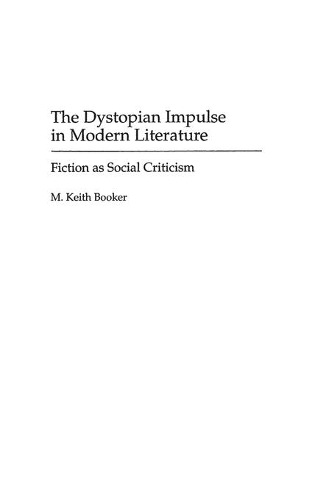
The Dystopian Impulse in Modern Literature: Fiction as Social Criticism
(Hardback)
Publishing Details
The Dystopian Impulse in Modern Literature: Fiction as Social Criticism
By (Author) Prof. M. Keith Booker
Bloomsbury Publishing PLC
Praeger Publishers Inc
17th May 1994
United States
Classifications
Tertiary Education
Non Fiction
Society and Social Sciences
809.39372
Physical Properties
Hardback
208
Width 156mm, Height 235mm
454g
Description
While literary utopias depict an ideal society and reflect an optimistic belief in the triumph of humanity and government, dystopias present a society marked by suffering caused by human and political evils. This book offers a detailed study of several literary dystopias and analyzes them as social criticism. The volume begins with a discussion of utopias, dystopias, and social criticism. By drawing upon the theories of Freud, Nietzsche, and others, Booker sets a firm theoretical foundation for the literary explorations that follow. The chapters that come next discuss Zamyatin's We, Huxley's Brave New World, and Orwell's 1984 as social criticism of totalitarianism, Stalinism, the dangers of capitalism, and fascism. Later chapters consider dystopias after World War II, contemporary communist dystopias, and postmodernist dystopias in the West.
Reviews
[An] outstanding volume in Greenwood Press' series on the study of science fiction and fantasy.... Booker's readings are often exciting, and his demonstrations that dystopian works deal with many of the same issues that modern critical theory treats are refreshing.... Booker's is a highly readable, extremely interesting text that contains many new insights into dystopian thought and literature.-Journal of American Culture
Booker's discussion usefully relates the important works of modern dystopian fiction to the tenets of important contemporary literary theories, and his coverage of newer Russian and American works of dystopian science fiction is especially informative. Upper-division undergraduate and up.-Choice
Essential to any future study of dystopian literature. Certainly, the bibliographies can lead us all to further fruitful investigations in the field.-SFRA Review
"An outstanding volume in Greenwood Press' series on the study of science fiction and fantasy.... Booker's readings are often exciting, and his demonstrations that dystopian works deal with many of the same issues that modern critical theory treats are refreshing.... Booker's is a highly readable, extremely interesting text that contains many new insights into dystopian thought and literature."-Journal of American Culture
"Booker's discussion usefully relates the important works of modern dystopian fiction to the tenets of important contemporary literary theories, and his coverage of newer Russian and American works of dystopian science fiction is especially informative. Upper-division undergraduate and up."-Choice
"Essential to any future study of dystopian literature. Certainly, the bibliographies can lead us all to further fruitful investigations in the field."-SFRA Review
"[An] outstanding volume in Greenwood Press' series on the study of science fiction and fantasy.... Booker's readings are often exciting, and his demonstrations that dystopian works deal with many of the same issues that modern critical theory treats are refreshing.... Booker's is a highly readable, extremely interesting text that contains many new insights into dystopian thought and literature."-Journal of American Culture
Author Bio
M. KEITH BOOKER is Associate Professor of English at the University of Arkansas. He has authored several books, including Dystopian Literature: A Theory and Research Guide (Greenwood Press, 1994). His articles have appeared in Texas Studies in Literature and Language, Eire-Ireland, James Joyce Quarterly, College English, ELH, and other journals.
